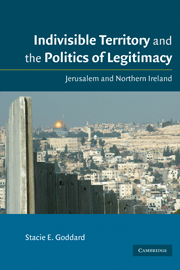Book contents
- Frontmatter
- Contents
- Acknowledgments
- 1 Introduction
- 2 Constructing Indivisibility: A Legitimation Theory of Indivisible Territory
- PART ONE CONSTRUCTING AN INDIVISIBLE IRELAND
- PART TWO JERUSALEM: THE ETERNAL INDIVISIBLE CITY
- Introduction
- 5 Dividing the Holy City
- 6 Jerusalem, Indivisible
- 7 How Northern Ireland Became Divisible (and Why Jerusalem Has Not)
- 8 Conclusion
- Bibliography
- Index
6 - Jerusalem, Indivisible
from PART TWO - JERUSALEM: THE ETERNAL INDIVISIBLE CITY
Published online by Cambridge University Press: 26 January 2010
- Frontmatter
- Contents
- Acknowledgments
- 1 Introduction
- 2 Constructing Indivisibility: A Legitimation Theory of Indivisible Territory
- PART ONE CONSTRUCTING AN INDIVISIBLE IRELAND
- PART TWO JERUSALEM: THE ETERNAL INDIVISIBLE CITY
- Introduction
- 5 Dividing the Holy City
- 6 Jerusalem, Indivisible
- 7 How Northern Ireland Became Divisible (and Why Jerusalem Has Not)
- 8 Conclusion
- Bibliography
- Index
Summary
In 1967, Israel annexed Jerusalem, yet still maintained divisible sovereignty. From a contemporary standpoint, Israeli policy seems remarkably flexible, with elites willing to divide geographic, religious, and even political sovereignty. Indeed many of Israel's policies in 1967 foreshadowed proposals for the city's division introduced in more recent negotiations over the city. In the 1990s, just as in 1967, elites searched for ways to share sovereignty within the city by devolving power, separating religious from political claims, and by exploiting the city's geographic ambiguity.
But by Camp David, it was clear that such divisions were impossible. On the Israeli side, maximalist definitions of Jerusalem had come to dominate their bargaining position. Claims that Jerusalem was its “eternal, indivisible” capital were increasingly heard in Israeli politics, with politicians from both the left and right pledging to maintain Israel's control over the eastern half of the city. Government policies expanded Israel's claims to the city. After 1967, Labor elites offered incentives for Jews to settle in certain areas of the city – particularly the Old City, which contained the Western Wall. Under Likud (the primary rightist party after 1973) settlement in Jerusalem expanded to include traditionally Arab areas and the eastern outskirts of the city.
The Israeli government also constructed legal obstacles to dividing Jerusalem. If the 1967 law unifying Jerusalem was at all ambiguous, the Basic Law on Jerusalem (1980) left no doubt as to Jerusalem's status; the law reinforced the claim that “Jerusalem, complete and united, is the capital of Israel.
- Type
- Chapter
- Information
- Indivisible Territory and the Politics of LegitimacyJerusalem and Northern Ireland, pp. 159 - 207Publisher: Cambridge University PressPrint publication year: 2009



